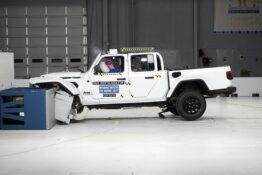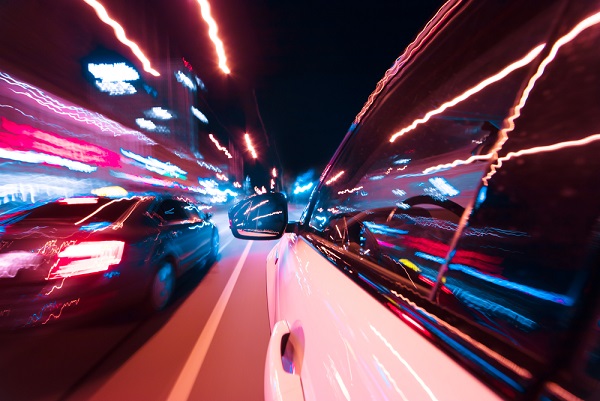|
|
 |
People are busy, life can be confusing and even the most attentive, caring parents can temporarily forget about a child in the backseat or think they made that stop at the daycare when, in fact, they didn’t make the drop-off that day.
Several companies, including Volvo, as well as the auto parts suppliers Hyundai MOBIS, part of the Hyundai Group, and Continental, have developed radar-like systems that operate inside the vehicle to detect the presence of any living being, whether a pet or a person. Hyundai MOBIS’s system is already being offered in its models in the company’s home market of South Korea and could come to the US next year, the company said.
via CNN
|
Robotaxis being operated by companies like Waymo and Cruise use scores of cameras and sensors to avoid screwing up traffic and crashing into stuff. Those cameras record everything, though, including the faces and license plates of the people and cars they drive past … and now, the cops want access to that video.
A senior policy analyst at nonprofit digital rights group Electronic Frontier Foundation (EFF), Matthew Guariglia, argues that the issue isn’t police gathering evidence, it’s that there’s not always transparency on how the data police will gather from such data seizures will be stored, or how the police can access it.
via CleanTechnica
|
Replacing the roughly 900,000 gas-guzzling light-duty automobiles in state and local government fleets with electric vehicles over the next decade could save U.S. taxpayers nearly $11 billion in lifetime expenses while reducing pollution and planet-heating emissions, according to a recent report.
According to the report, the biggest savings—more than $8.5 billion—would be on fuel costs, followed by nearly $6.9 billion saved on maintenance, over $3.5 billion in depreciation costs, and $1.1 billion on insurance. Greenhouse gas emissions would plummet by nearly 26 billion tons, a 63% drop compared with a scenario in which state and local governments purchase fossil-fueled vehicles to replace their old ones.
via Common Dreams
|
Domino’s Pizza Inc. isn’t just the largest pizza company in the world. It also lays claim to the largest electric pizza delivery fleet in the country, which is expanding with more than 1,100 custom-branded 2023 Chevy Bolt electric vehicles on the ground and in use at select franchise and corporate stores by the end of the year.
“We’re continuing to see a wide range of advantages from using EVs,” said Joe Jordan, Domino’s president of U.S. and global services. “In addition to business and environmental benefits, an electric delivery fleet also helps with hiring drivers, as they open up a whole new pool of job candidates who may not have their own vehicles.”
via PR Newswire
|
|
|
|
|

By Dave Bean, FMW Associate Editor
Manufacturers of five small pickup trucks with crew cabs were disappointed to learn the results of the recent Insurance Institute for Highway Safety’s (IIHS) updated moderate overlap front crash test on those vehicles.
Only the Nissan Frontier had so much as an ‘acceptable’ score. Those receiving less than acceptable ratings include Ford Ranger, Chevrolet Colorado, Jeep Gladiator and Toyota Tacoma.
“Our updated moderate overlap front crash test proved to be challenging for small pickups,” said IIHS President David Harkey. “A common problem was that the rear passenger dummy’s head came dangerously close to the front seatback…”
READ MORE
|
|
| |
Drug & Alcohol Impairment
|
|

By Adam Danielson, Director of Business Development, SuperVision
Excessive drug and alcohol use in the U.S. negatively impacts almost every aspect of our society and economy.
And the trucking industry is no exception, where positive drug test results are rising. In the first three months of 2023, truck drivers testing positive for marijuana increased by 9.2%. Also, many of these drivers have not enrolled in the return-to-work program. This troubling data from the Drug and Alcohol Clearinghouse defines the significant challenges this problem puts on fleet management.
However, there are ways of dealing with drivers testing positive for marijuana.
One of the most effective ways is proactive monitoring. In this article, you will learn more about this issue and how preventative fleet monitoring with SuperVision can help protect your fleet from the increasing drug and alcohol challenge.
READ MORE
|
|

By Sumit Chauhan, Co-founder and COO, Cerebrum X
More vehicle fleets are leveraging Artificial Intelligence (AI), data analytics and sophisticated management technology in many areas of their fleet operations.
Predictive fleet maintenance with data-driven insights predicts equipment or vehicle failure. Fleet management is crucial to maintain cost efficiency, operations, and user safety.
The more datasets AI collects with OEM processing via the cloud, the better predictions it can make for vehicle fleets. This means safer, more intuitive automated vehicles in the future with more accurate routes and better real-time vehicle diagnostics.
READ MORE
|
|
|
|

